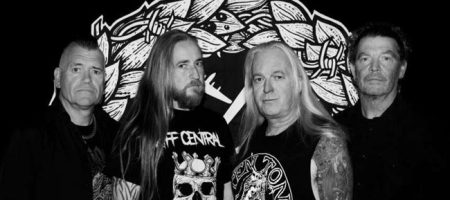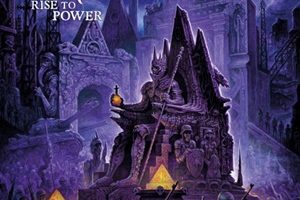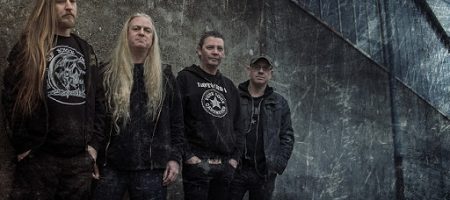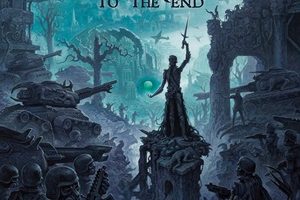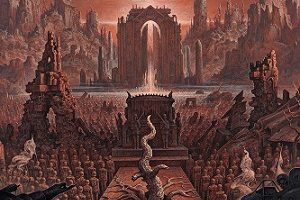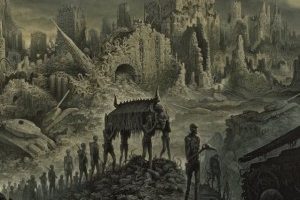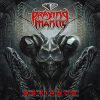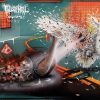Memoriam – Fallen Requiems
Wednesday, 10th July 2019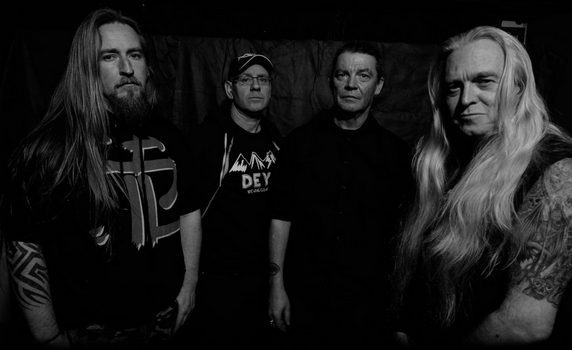
While Memoriam might be a fairly recent addition to the death metal community, its members are some significant veterans. Formed initially by vocalist Karl Willetts and drummer Andy Whale to pay tribute to Bolt Thrower drummer Martin Kearns (R.I.P.), the pair found completed the line-up with some experienced members from Sacrilege and Benediction. The rest was history as they have geared up and released three albums over the course of the last three years in celebrated fashion. Following up on the band’s latest release, Requiem for Mankind, we took a few moments to chat with Whale about many facets of the band, and even some things going back to the Bolt Thrower years as well as his personal journey.
Dead Rhetoric: Three albums in three years. What do you feel is generating the momentum?
Andy Whale: When we were in bands in the early days, like Bolt Thrower, bands did get albums out every year or year and a half. Two years max. It’s funny really, because when we decided to do Memoriam, Karl [Willetts] and I just wanted to get together and play some covers, but then we got Frank [Healy] and Scott [Fairfax] involved, it went from there.
I remember that when we did the first album, to be honest, in 2016 we just had the idea of getting the album out. We went to Nuclear Blast headquarters to promote the album for a weekend [press] thing, and I can still remember all of these people there and Karl got up and did this speech and said that it would be a trilogy of albums. Scott, Frank, and I all looked at each other and were like, “When did he think of this?” He just seemed to pluck it out of the air! So the next thing we knew, we were in a band that was going to do a concept of three albums.
The reason that we have done it so quickly is that Scott has a lot of brilliant riffs and we managed to have enough resources for three albums. Just for the fact of having that much material, we sort of worked and worked and worked. All of our ethos’ over the last three years has been to record an album, go out and do shows and festivals, and while we are doing that, we work on new stuff. It just went from there. At times it has been stressful, but still in a fun way if you know what I mean. It’s not hard work, but getting things ready to go. I think it’s worked quite well so far in the way that everything has gone.
Dead Rhetoric: Was there anything you wanted to accomplish with Requiem for Mankind, being that is was the third album?
Whale: For me personally, and I think the rest of the lads as well, we had this idea that we wanted to work with Russ Russell at Parlour Studios. We wanted to work with him on the second album but the timing didn’t work out. He wasn’t available at the time. We knew that if we got Russ involved early, and we were able to pass him the songs as we were writing them, we could get something big production-wise for the album.
For the Fallen, that album was us experimenting with the sound for Memoriam to have. It’s easy to get four blokes into the rehearsal room and make songs up. We’ve all been different bands over the years, but we wanted to see what our sound, the Memoriam sound, would be. I think that with For the Fallen and The Silent Vigil, that was what we were doing. We were experimenting with the sound of the band.
This album, Requiem, is a culmination of the experimentation of us trying to find out who we are as a band. I think getting Russ involved as well, just gelled it all together and it has worked better than any of us could have expected or hoped for. This will be my 8th studio album (5 with Bolt Thrower and 3 now with Memoriam), and I would say that on a personal level, it’s my favorite. I feel that I have done the best drumming that I could do on it.
Dead Rhetoric: So this is the end of that trilogy we were discussing, so is there a plan moving forward at the moment?
Whale: We just want to enjoy the moment. For the last three years, we’ve been recording an album, releasing it, doing shows, and prepping new material. What we want to do now, since we have live shows booked up every month for the next year – we want to concentrate on enjoying the live shows.
We also have a little bit of a problem now too. When we first started, we had 9 songs. It was a 9 song album, but we couldn’t play all of them because a few, like “Last Words,” that we didn’t feel we could do justice to it live because of its length. We are working on using things like samples as well. So when we started playing live, we also did some covers, which was great. Then we had The Silent Vigil, and now 18 songs. Obviously we couldn’t play them all. And now we effectively have 27 songs to choose from. Most of our shows, like a festival, are about 45 minutes. If we headline a festival it might be an hour. If we do a headline club show, it’s about an hour and fifteen minutes. I think the longest set we are going to be doing in the next year would be the album release show. What songs do you choose in an hour and a half?
So all we are doing is concentrating on the live shows and see what happens over the next year. I think Scott will be working on another album behind the scenes. We’ve also had an idea of doing a cover album of songs that we like – bands like Anti-Sect, bands that got us inspired and into music. But we don’t know. We will see how the next year goes and enjoy it. We’ll sit down in 2020, but after doing three albums in three years, we want to take things [slowly]. I’ll be 55 this year, and with the type of drumming I do, even though I’ve changed my style over the years, I don’t know how much longer I can keep going for. I’m taking it as it goes, year by year. Hand in heart, there’ll be something else coming out in the future, but if people are looking for a fourth LP next year, they are probably going to be disappointed. It’ll probably be a little bit longer.
Dead Rhetoric: How important has it been to have that consistent Dan Seagrave artwork for all three albums?
Whale: Yeah – another story again! When we first met about doing the band, we met up on the local pub, one thing we talked about was what we wanted as a band. Scott said he had always wanted a Dan Seagrave cover. Dan has done Benediction covers, so Frank has a contact, so we got in touch with him and he was up for it. As the albums went along, with the first one and The Silent Vigil – we gave him some rough sketches of what we wanted, but with the new one I don’t think he needed any ideas for us. He just sort of knew what we wanted. It’s been brilliant. To get one Dan Seagrave cover is not bad, but to get a whole trilogy of them [is something else].
I love the way that they interact with each other as well. You can see parts of how they interact, especially with the new one. The first one was all about grief, with the funeral procession. The second one was about the wake, and now the third one is that sort of thing – the final, putting them to rest. Going down into the ground. Dan has done an absolutely brilliant job. The whole panoramic view on the new album, that bleak, stark background of a broken world – it’s an image that we can say that is what the world is like today. But everyone can look at each album and get their own perspective from it. When I was in Bolt Thrower, some of those were absolutely brilliant, like Realm of Chaos. But I think these Memoriam albums are really at the next level.
Dead Rhetoric: You were out of metal for quite some time, did you follow the scene still during that time?
Whale: I was in Bolt Thrower from ’88 to ’94, but to be honest, when I left I completely walked away from things. Back in 1994, the Internet wasn’t really readily available so when I decided to leave the band – to be honest I was completely burnt out with everything. I just wanted to go away and to some extent, not be me – Andy Whale…not that being in Bolt Thrower made me famous or anything, but I wanted to get away from that aspect of my life. I had a few personal problems that had culminated to a point when I left Bolt Thrower.
I needed to get away from everything and get on with my life. In those days, you could just walk away from it. But with a band like Bolt Thrower, they were an influential band and you find yourself walking away from it. A few years later, in those films where people go walk through the desert or something and you come upon footsteps and you end up having gone in a big circle – that’s what it was like. I’d go for a year or three without any contact and then it would be there again. Then you make a conscious effort to get away, but it keeps happening and happening.
In the end, you realize what it is and you embrace it. With Bolt Thrower, the good times/bad times, there were great times and it’s a part of my life, and it’s the reason why I’m here today [with Memoriam]. I always kept in touch with close friends, like Karl. There might be years where we see each other once or twice, or some years where we see each other every weekend. I’ve kept in touch with people that were important to me in a way.
Dead Rhetoric: Where you surprised by any of the changes, or lack of changes, to the genre when you returned?
Whale: The main thing I noticed – when I was in Bolt Thrower, there were a lot of people in bands, but there weren’t a lot of bands around. Now there seems to be a ton of bands. It’s not a bad thing, but there are absolutely tons of bands around. It amazes me that younger bands can get off the ground. There’s so much competition in a way.
The other thing I noticed is that festivals have kind of taken over everything. There’s so many between June and late August/early September, especially in Europe, that it seems like it’s not worth playing club shows. Everyone is at the festivals, and it’s a struggle to get people to shows. You end up relying more on playing festivals. Which is great in a way, since you can go away for a weekend and play in front of bigger crowds at like Wacken and Hellfest. There was about 5,000 people in a tent watching us last year at Hellfest. You have to be honest with yourself. Were all of those 5,000 people there to watch Memoriam or were they just interested in seeing whatever was on the stage? That’s what you do festivals for – you play in front of people who normally don’t see you. It’s differences like that really.
I left Bolt Thrower in ’94, and when I started with Memoriam again, it was amazing how many bands from back in the day are still out and about, and are still pretty big. I know they have been at it for 20 years but it’s really good to bump into people and have an instant connection with them. We played Wacken in 2017 and we were in a hotel and Paradise Lost showed up. I haven’t seen them in 20 years, but you have that connection. You can have a beer and it’s like you are 20 years back in time.
Dead Rhetoric: You mentioned that you changed your drumming style over the years. How do you see the evolution of your drumming?
Whale: The main thing I did, when I started back up into Memoriam, I had been using heavier gauge sticks. Very quickly I realized they were too heavy, so I went to lighter ones. In terms of techniques, it’s been things like finger techniques instead of just bashing and just being lighter so that I’m more effective. When I was in Bolt Thrower, at the end of a show, my legs – do you remember Jane Fonda? She used to talk about the burn in a workout? My legs were like that at the end of a Bolt Thrower show. My muscles would burn. Nowadays, we aren’t quite as fast as we used to be, but it’s about using less energy and being more relaxed.
It’s weird trying to explain it, but it’s about switching things off and just using the parts of your body that you need. I’m very relaxed on stage, I don’t move a lot and I concentrate a lot on the music – I don’t have these facial expressions and I’m not thrashing around, so some people think I’m not really enjoying myself on stage. I am, but I’m in my own zone really. It’s like any musician really, it’s like finding where you feel comfortable and trying different techniques out. When I was in Bolt Thrower I was a lot younger and liked playing fast and hitting things. It was what I liked doing.
When I was on tour, I had a lot of bad habits, and now I am watching people and trying different things. If I had done that years ago, to be honest, it would have been great. But I like to watch other drummers drumming and pick up tips/tricks. That’s really the only way my style has changed. I think I have one of those styles, that if I’m honest, I might not be the best drummer, but if you heard me playing, you would know it was me.
Dead Rhetoric: You alluded to this a little bit when we talked about the artwork, but what are some problems that you see with today’s world?
Whale: It’s a great place, but over here in Europe we have been stuck in this Brexit debacle. It’s just politics at the moment. You are getting to the point where the politicians – my personal argument, especially with the politicians in the UK is that you vote people in who should be able to make the right decisions, yet all that has happened with Brexit is that the politicians are bickering like you and I would. It’s just ridiculous. People need to sit down and discuss what is best for the nation and the world. All over the world, everyone seems to be blaming things, like immigration. It’s a cheap vote. I don’t want to get into all these politics, but there are so many people living on the street. Some have mental problems, family problems, and quite a few were in the armed forces and have things like PTSS. There’s no support for people – it’s all about people with money. The poor get poorer and the rich get richer.
It’s the same for me personally – when I was an 18 year old it was exactly the same. The conservatives were there, crushing the miners and killing industry off. It was all the working class people that get bashed. It’s annoying really. Karl deals with all of that sort of stuff. I agree with what he says, and as you can tell, it does affect me. I’ve got children as well. It just seems like the world that we are in at the moment is going bonkers. You worry for the kids really. What will it be like for them when they grow up? But the world is the world, isn’t it? I’m sure there’s a political blueprint for how the UK works, and it doesn’t matter what politicians you get in it, they stick to the blueprint and twist a few things, give a few tax breaks, and it keeps rolling. You just worry for the kids, and what kind of world will be around.
But at the end of the day, life is too short so try to enjoy yourself and see what happens. But it does worry you. We have quite a lot of criticism about bringing politics into music as well, but what people have to realize, when we grew up bands were very political so it’s the norm for us. You had those Vietnam protests and all of that. When people feel that they are being used, they get in the streets and protest, and people tend to write songs about that. People like Bob Dylan – they just talk about life in general, and for us, that’s normal. But each to their own.
Dead Rhetoric: In terms of getting older, is it tough to balance doing a band and having some sort of family life?
Whale: Yeah, that was one of the things we talked about with Memoriam. Family lives would come first. Obviously we all have jobs as well. I’m lucky enough that I only work 3 days and then the rest of the time is family and band stuff. We made a decision early on to not do big long tours. We don’t want to be away from family for too long. Also, at our age, I don’t even know what I would be like after a week of a 6 week tour [laughs]. I’d probably be at the chiropractor and rubbing myself with gel.
So we tend to do long weekends – fly in and fly out. It limits us in terms of where we can go, but we are working on it. If you are in the position that you can earn enough from the band that it’s worthwhile to do it, then it might be different. But we are quite a small band in the death metal scene. Maybe if we did more shows, we’d make more money, but we wanted to do things the way we wanted to with Memoriam and we have stuck to it. It is what it is.
Dead Rhetoric: To wrap up, what’s next for Memoriam this year? Just touring right?
Whale: We’ve got shows lined-up for every month until about May next year. We are just going to concentrate on that. Like I said earlier, we are just going to see what happens from there. We have the option to do another album with Nuclear Blast. So it’s a case of just rehearsing and promoting the album. The interest has really ramped up for the third album, which is really good. Hopefully a good chunk of people will like it and want to support the band, so we want to get out and have a bit of fun.











